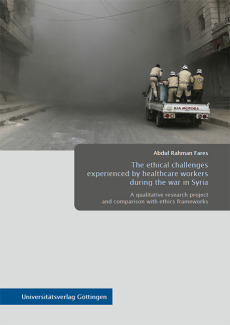Abdul Rahman Fares
The ethical challenges experienced by healthcare workers during the war in Syria
A qualitative research project and comparison with ethics frameworks
The war in Syria has lasted for many years and continues to cast a dark shadow over its people, including healthcare workers caring for those injured and in distress. During the war, healthcare workers have been exposed to unprecedented challenges, becoming targets of bombing, killing, siege, arrest, and torture. Moreover, healthcare workers continue to experience difficult situations that require them to make decisions with no clear or easy moral choice. The present study aimed to understand the experiences of healthcare workers and the difficulties and challenges that hinder applying existing ethical frameworks and codes for disasters within Syria’s context of revolution and war. Qualitative analysis of interviews led to classification of the ethical challenges experienced by healthcare workers into four groups: the risks from providing care; stewardship of resources and work challenges; corruption and organizational pressure; and psychological, emotional, and social stress. The study also showed that both Syrian healthcare workers and the developers of ethical frameworks adopt many similar values and principles. Yet, the participants adopted several unique moral values not identified in ethical frameworks as a result of navigating their professional duties under the circumstances of the Syrian war. At last, recognizing the challenges and precarious tasks healthcare workers cope with during wars and other similar disasters could help volunteers, medical personnel, and humanitarian organizations deciding to work in Syria better understand the specific context and obstacles for ethical decision-making. Moreover, attracting attention for and support of Syrian healthcare workers locally and globally presents a long-lasting benefit.

